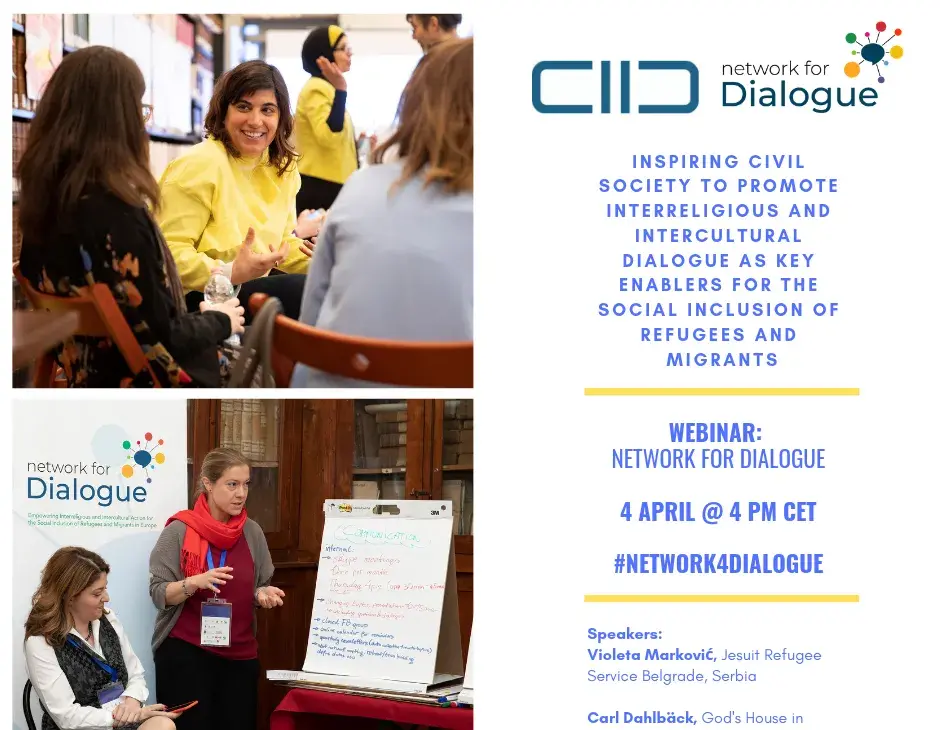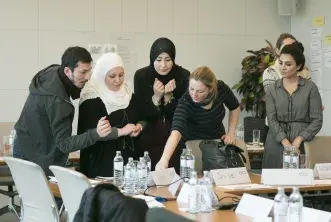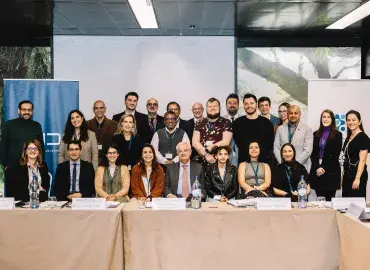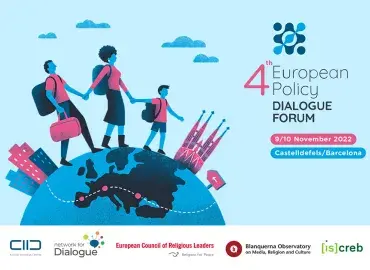Sharing experiences for the social inclusion of refugees and migrants in Serbia and Sweden
On 2 April 2019, the KAICIID Dialogue Knowledge Hub hosted a webinar of the Network for Dialogue, entitled Inspiring civil society to promote interreligious and intercultural dialogue as key enablers for the social inclusion of refugees and migrants. This webinar included two speakers: Violeta Marković - a Country Manager of the international civil society organization Jesuit Refugee Service (JRS) in Belgrade, Serbia, and Carl Dahlbäck - Priest of the Evangelical Lutheran Church Sweden and Vicar Nacka Parish/ELCS of the Stockholm Diocese in Sweden.
The webinar speakers are members of KAICIID’s newly launched Network for Dialogue, a European network of faith-based and secular organizations working in social inclusion of refugees and migrants on the local, national and international levels. Network gathers religious leaders, academics, NGO representatives and experts whose work is focused on interreligious and intercultural dialogue in support of migrants and refugees.
Guest speaker Ms. Violeta Markovic focused on the work of the Jesuit Refugee Service, international Catholic humanitarian organization working in 50 countries worldwide. Focusing on the JRS main activities in supporting unaccompanied minors in Serbia, Ms. Markovic described the levels of integration of children into the educational system but also the collaboration with the government institutions. Speaking about the JRS activity within the Network for Dialogue, she stressed: “We don’t have a lot of activities regarding advocacy work and rising awareness, it is mostly done on an individual level, so I think this Network can also help us to build our capacities to advocate for rights of unaccompanied minors in Serbia and refugees in general, but also to we can share our good practice in working with unaccompanied minors to other country members”.
Second guest speaker was Mr. Carl Dahlbäck who presented his project called “God’s House: where people meet” in Nacka Parish in the Stockholm suburb of Fisksätra in Sweden. Speaking about this unique interreligious project, Mr. Dahlbäck explained that the main aim of this initiative was to bring together the three biggest religious communities - Lutherans, Catholics and Muslims under one roof. The project started in 2009 with the idea “to find a common mission together in the society” as Dahlbäck stressed “when you have the same idea what the mission is, it’s easier to find the path forward to the future”. Building the church and the mosque on the same land symbolically brings different religious communities closer and opens new levels of collaboration. The God’s House is a meeting place across the diversity of many borders, it opens the possibility to meet and to get to know each other in this community. “We are a workplace for human rights and inclusiveness. We are the pathways of integration. One of the pathways. I think it’s also important to religious organizations to show religions are not social conflicts and wars, its opposite, but peace and understanding and respect for each other” he said.
Presenting these two organizations and their grassroots initiatives, members of Network for Dialogue showed how they use interreligious and intercultural dialogue working with refugees and migrants in Serbia and Sweden. The webinar moderated by Johannes Langer, the Programme Manager of the People Seeking Refuge in Europe Programme of KAICIID, was followed with a lively discussion that included questions related to the specific areas of the guest speakers work as well as the Network for Dialogue activities and the possibility to join. The Network for Dialogue can always be contacted via [email protected]
Youth unemployment, access to affordable and quality education, and disengagement from political and cultural life are urgent…
International Dialogue Centre (KAICIID), Blanquerna Observatory for Media, Culture and Religion and partners to co…




